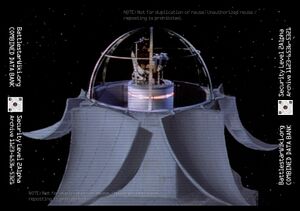Celestial chamber
More actions

Celestial chambers (or celestial temples) are areas on Galactica and other battlestars where navigational readings were taken hundreds of yahren prior to the destruction of the Colonies.
Over the hundreds of yahren in the later-half of the Thousand-Yahren War, celestial chambers were mostly removed from battlestars in the Colonial service, as their use was superseded by advanced technologies.
At the interior center of the dome is a single-user console with a crane-suspended sextant-like device. The console features a scanner that allows for visual reception of transmissions, including those on the later-disused gamma frequency band.
Celestial chambers are built with a semi-spherical shell of transparent tylinium, which could be shuttered over when not in use (TOS: "The Hand of God").
A Fateful Signal
edit
In the aftermath of the Exodus, Captain Apollo happens upon an unused and, perhaps the last remaining, celestial chamber housed near one of Galactica's engines accessible by a lone hatch. Being the only known celestial chamber in existence, Apollo repairs it over time, introducing it to Lieutenants Starbuck and Sheba, and Cassiopeia, during a personal excursion. During this introduction, they happen upon a distorted gamma frequency signal, which is later lost during the Battle at Galaxy's Edge.
Apollo attempts to rediscover the transmission, but fails to do so... although, unbeknownst to him, Starbuck trips a toggle switch on his way out, and this allows a cleaner version of the signal to be received (TOS: "The Hand of God").
Related Media
editNotes
editRelated Imagery
edit








